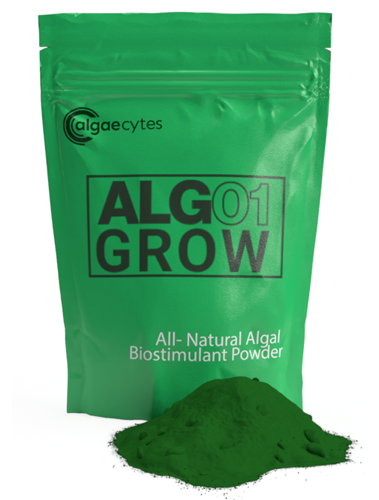Agricultural Biostimulant
Naturally Innovative Ingredients
ALG01 Grow

ALG01 Grow, sustainably cultivated from nutrient-rich algal biomass, is a premium crop biostimulant. It offers a natural, eco-friendly alternative to chemical synthetic fertilizers for organic crop cultivation.
Our biostimulant is sustainably sourced from nutrient-rich algal biomass that is high in nitrogen, phosphorous, and hydrolyzed peptides. Nitrogen enhances leafy growth and overall plant vigor, while phosphorus supports root development and potential yield improvements. Hydrolyzed peptides are believed to aid nutrient absorption and plant resilience. These benefits can contribute to improved crop health and potential yield enhancements.
Algal biomass is a versatile and renewable resource that can be grown sustainably. It offers a myriad of advantages as a biostimulant for agriculture. By incorporating algal biostimulants like ALG01 Grow into your crop cultivation, you can promote healthier, more robust plants and align with sustainable, environmentally responsible farming practices.

Algal biostimulants are packed with growth-promoting hormones, vitamins, and amino acids that enhance plant growth, vigor, and overall health, leading to increased yields.

Algal biomass is a safe, non-toxic, and biodegradable product, ideal for organic agriculture. Unlike synthetic fertilizers, it leaves no harmful residues in the soil or food supply, ensuring both environmental and food safety.

Algal biomass is a renewable resource that can be grown in a variety of environments, including wastewater and saline water. This makes it a sustainable and environmentally friendly option for agricultural biostimulants.

Algal biostimulants can help to improve soil health by increasing organic matter content and promoting microbial activity. This can lead to better nutrient retention, improved drainage, and reduced erosion.